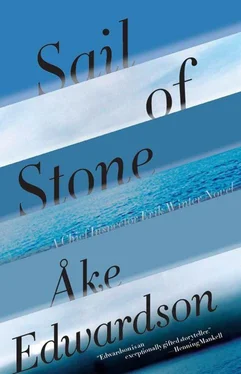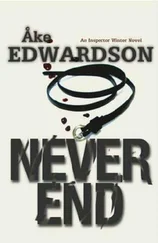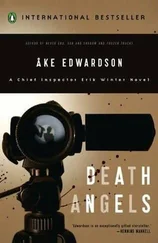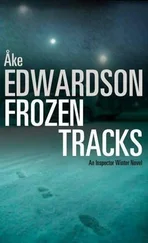Mrs. Watt had a memory that came and went. In addition, she had spoken a kind of Scottish that seemed to be too much even for Macdonald. Once she had nodded to herself and said, “Gie yehr ain fish guts to year ain sea myaves.”
“What did that mean?” Winter had asked when they were standing outside again.
“‘Give your own fish guts to your own seagulls,’” Macdonald had answered, “but I don’t know what it means. ” He began to walk. “Maybe that you should take care of yourself and to hell with everyone else.”
At the summit there was only sky and sea over the edge.
Mrs. Watt had spoken about “a stranger.”
He had lived by himself in a little hovel next to the Cullykhan caves in the cove next to Pennan Bay.
“But there’s nothing there now,” she had said.
They had climbed over there, but there was nothing there.
“He was there and then he was gone,” she had said.
“When was that?”
“The war. During the war.”
“What did he do?”
“What everyone else did, I assume. Smuggled.”
“Did you meet this stranger?” Winter had asked Mrs. Watt.
“No.”
“Did you see him?”
“No.”
“Where did he come from?”
“No one knew. Not that I know of. And no one asked. Not then.” She had squinted her sharp eyes, which were like black stones. “They had probably checked him out and I guess he was allowed to stay.”
“They? Who are they?” Macdonald had asked.
“The men in the village.”
“Are any of them still here?”
“No.”
“None at all?”
“Not from that time.”
“What happened to the stranger?” Winter had asked.
“I guess he’s just gone.”
They drove west, toward Macduff and Banff.
“There were lots of people who came and went back then,” said Macdonald.
Winter didn’t answer. He looked out over the sea below the precipice. One quick movement of the wheel and they would be flying.
“What are you thinking about, Erik?”
“About something I’ve seen and yet not seen,” said Winter.
“A common problem for a policeman,” said Macdonald.
“Fuck.”
“When? Where?”
“Recently,” said Winter. “During this trip.”
“Think back.”
“What do you think I’m doing?”
There were some dark streaks across the sky. The sun disappeared. Macdonald thought about putting in a CD but he hesitated.
“It has to do with the photograph,” said Winter. “Of Osvald.”
Macdonald looked up at the sky.
“We’ll have to find an inn to stay overnight.”
Winter nodded.
“I know the place,” said Macdonald. “The Seafield Hotel in Cullen. It’s a classic. I didn’t remember it before, but now I do. You can try Cullen skink there!”
He heard them talking behind his back. He wanted to know who they were, and why they were there. He didn’t move. He had seen them arrive, and he understood.
She didn’t say anything when they ordered.
Maybe she understood too.
It was only a small favor. He knew that he could ask her. A single conversation. A simple question.
But he didn’t trust her anymore.
He had decided to tell everything. It was time. When had he made his decision? It had to do with the sea. The loneliness.
After all these years. It was easier at first.
When he was going to leave it all, it was harder. Not hard to leave; he had longed to do that. Longed. But he didn’t want to do it alone, not now.
Who could believe it would happen like this? That the boy…
Take the car, the boy had said. I don’t need it.
There was a shine in the boy’s eyes.
It’s all over now, the boy had said.
The boy prayed, he prayed all the time. His good sense seemed to disappear.
It had been tranquil by the sea. It was a peaceful beach.
Drive! the boy had screamed. He had hesitated.
Drive! The boy screamed again and his white hair stood straight up. His body looked old. It was old, but not as old as his.
The boy was blue in the face. His heart. The blue color disappeared. The boy walked on his own on the other side of the little lake, and he prayed.
Jesus!
A cry over the mountains.
We are all lost, he had said afterward. I will wash away our sins, wash us. I am glad that you sent for me. Drive now!
At night the dreams came back. Dreams of gold, of silver, of the money that destroyed everything.
How often had he sat with this pistol in his hand? First it was the threat, soon after. When he was staying hidden in cliffs, huts, on rotten ships. He had shot once.
Then there were the thoughts of doing it by his own hand. On his own.
He didn’t know what would happen.
He carried it with him night and day.
He’d had it when he heard the voices in the Three Kings, when he saw them. They came from the other world.
Now his memories flowed on, flowed up. There was water everywhere; the sea washed over him. He had placed the dinghy in the shadow of the waves. The Marino had already begun to sink.
It was necessary. Egon had already been lost then. The trawler was lost.
He had felt Frans’s face in his hands. Jesus! There had been no one to listen out there. God wasn’t listening; not God’s son. On the beach there were only stones. He made his choice. No, not then. It was long before.
There was still money in the oilcloth bags. The weapons were on the bottom or had been carried farther north, like the bodies.
The boy’s boy hadn’t asked any questions.
The boy’s boy.
Here!
Bring it here!
They would never find him. Never! His face was different, his body. His name. His life, what was left.
He saw them out on the street, but it was a coincidence. They had been standing in front of the telephone booth, a coincidence. They had walked by.
None of them would find out!
Aneta Djanali was sitting in Halders’s kitchen. She had wrapped a blanket around herself; she was freezing and the kitchen was the warmest place. Hannes and Magda were at a birthday party at a house three blocks away. It wasn’t evening yet. Halders was making a quiche for some reason. A good smell was coming from the oven. Halders let Lucinda Williams sing from the living room in her cracked voice, lonely girls… heavy blankets cover lonely girls.
Aneta had had a short conversation with Anette Lindsten. Anette had been on her way down to the house by the sea, she said.
Was she running away again?
Everything about this was running away, sometimes invisibly.
This was part of the hell that struck the women, she thought. A horrid combination of guilt and fear and control and ownership.
She didn’t want to think about it, but she couldn’t stop.
It was about a woman’s right to her own life. That was exactly what it was about.
Control over the woman’s life. What it was about.
She didn’t doubt for a second what it was about for Anette. Hans Forsblad wouldn’t give up control, would not give up control. Nothing stopped him. He stayed hidden, but he was there . Aneta had seen his eyes. His eyes when he looked at her.
Two things were missing from her home.
She had discovered this while she was waiting for her colleagues from Lorensberg, or maybe it was after they were there.
The shell that had stood next to the telephone on the shelf in the hall. It was large and shimmered blue. It was almost transparent. Aneta had found it in a cove outside Särö, and it had been standing in the same place for two years and she hadn’t even dusted it, as far as she remembered. The traces the snail left behind had been visible, a bare spot in a sea of fine dust.
Читать дальше












